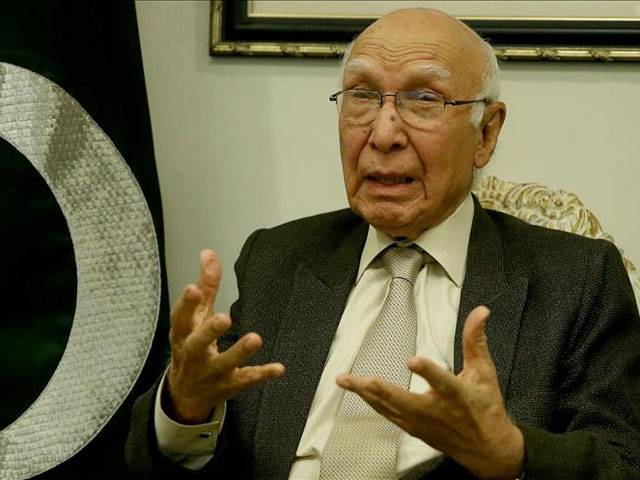ISLAMABAD - The government on Thursday decided to hold further consultations on the Federally Administrated Tribal Areas (Fata) reforms package to evolve consensus before its implementation.
The decision was taken at a meeting of the federal cabinet held here with Prime Minister Nawaz Sharif in the chair.
Coalition partners, Jamiat Ulema-e-Islam (JUI-Fazl) and Pakhtunkhwa Milli Awami Party (PkMAP) had reservations over the package finalised by the government.
Earlier, Adviser on Foreign Affairs Sartaj Aziz, who heads the committee on reforms package, had tabled the final report before the parliament. The committee recommended merger of the Fata into the Khyber Pakhtunkhwa province.
Aziz had held meetings with the stakeholders before finalising the recommendations.
The cabinet meeting considered the 23-point agenda including report of the Fata Reforms Committee.
Other items on its agenda included setting up of a permanent secretariat of the Council of Common Interests, repatriation and management policy for Afghan refugees, Iran-Pakistan Gas Pipeline Project, and consideration of draft agreements and memoranda of understanding with several friendly countries.
Briefing journalists after the cabinet meeting, Federal Minister for States and Frontier Regions Abdul Qadir Baloch and Minister of State for Information Marriyum Aurangzeb said that the government had decided to satisfy the JUI-F and the PkMAP before starting the implementation process.
“The government has decided to hold further consultations on the package. There have been some reservations and we want to resolve those,” Baloch said.
He said the government did not want to impose its decisions on the people of the Fata. “We can take time for implementation. We are in no hurry. Once we have evolved consensus, we will go for the implementation,” Baloch said.
The minister said Prime Minister Nawaz Sharif appreciated the Fata Reforms Committee for “formulating a comprehensive package for the tribal people.”
But the prime minister said that it was important to hold consultations with the stakeholders who had reservations.
“The package would be finalised once everybody is happy with it. There is need to listen to all,” he quoted the prime minister as saying.
Baloch said the Fata Reforms Package recommended phase-wise merger of the tribal belt in the Khyber Pakhtunkhwa province.
He said parliamentarians from Fata and majority of the people living in the tribal areas had supported the move to merge the belt into the Khyber Pakhtunkhwa province.
“The government is still continuing consultations despite a majority decision,” Baloch said.
He said a 10-year development plan for the Fata was included in the reforms package to bring those areas at par with the KP.
The minister said the funds for the proposed development plan would be arranged from the federal divisible pool.
“There will be a meeting of the Council of Common Interests tomorrow (December 16) for discussion. This decision will affect the provinces, so they must be taken onboard,” he added. Baloch said the government engaged all the stakeholders in the discussions over the Fata reforms package.
He recalled that the committee held 16 tribal assemblies over the package. “The differences of the JUI-F and the PkMAP are not serious. They have different points of view on some points, which will be addressed,” Baloch said.
He said the government wanted to give equal rights to the people living in the tribal areas. “We want them to enjoy their rights as Pakistanis. They are patriotic Pakistanis and deserve their rights,” Baloch said.
Marriyum Aurangzeb said that in the past the Fata reforms package had been a topic of discussion but nobody could give it a final shape.
“Our government can take credit that we took it to a final stage and are nearing its implementation. It is a big decision for the people living in the tribal areas and we want to satisfy all the stakeholders,” she maintained.
Aurangzeb said that the implementation process was not that far away.
“We are almost there. The implementation process will begin soon,” she claimed.






